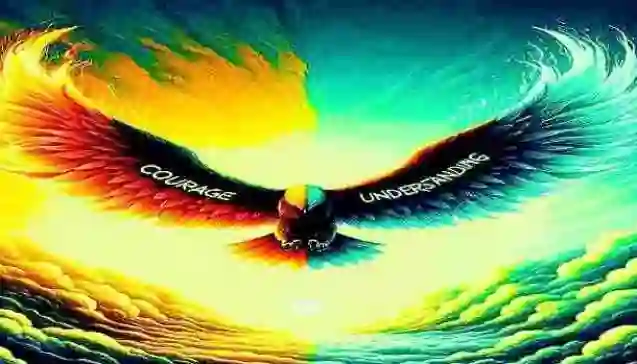Have you ever noticed that some people take huge risks and still succeed, while others are scared of even small opportunities? On the other hand, some overthink so much that they never take action.
Between these two extremes lies the secret of success: the right blend of courage and understanding.
Life is like a car journey. In this car, courage is the accelerator. It propels us forward, gives us momentum, and encourages us to explore new paths.
Understanding is like the brakes and the steering wheel. It helps us stop at the right time, guides our direction, and keeps us safe from crashes.
Without both, the journey cannot succeed. If you only press the accelerator, the car will lose control and crash. If you only use the brakes, the car will never move.
In this article, we will study these two life skills—courage and understanding in depth.We will learn what they are, why they matter, and, most importantly, how to find the golden mean between them in our careers, relationships, and personal lives using practical examples.
what is courage? (Not Just Taking Risks!)
Many of us think courage means jumping off a high cliff, doing dangerous stunts, or diving into a task without any thought. However, those actions are acts of recklessness rather than courage. True courage is much and very different from thoughtless bravery.
Victory Over Fear Is Courage:
- True courage isn’t the absence of fear but the ability to move forward even when you’re afraid.
- Example: Imagine you have to give a presentation at work. You feel scared, your hands shake, and your throat is dry. Still, you accept the fear, prepare well, go on stage, and share your ideas—that is true courage.
- Courage means stepping outside your comfort zone. Growth happens exactly where things feel uncomfortable.
Calculated Risks:
- Successful people don’t take blind risks. They analyse the situation, consider possible outcomes, and then make a decision. It is a “calculated risk.” This kind of courage is the foundation of understanding.
- Example: Quitting your job to start your own business is a bold step. Studying the market, planning your finances, and developing a backup plan demonstrate a solid understanding of the situation. Combining both courage and understanding increases your chances of success.
Meaning of Understanding:
If courage is the engine, understanding is the headlight. It reveals the challenging road ahead, including the twists, turns, and potential dangers. Understanding isn’t just being careful; it’s deeply grasping the situation.
Ability to Analyze Situations:
- A wise person doesn’t make quick decisions. They pause, think, gather information, and then act. This skill saves them from many mistakes.
- Think about it: haven’t we all, in anger or excitement, said or done things we later regret? It is precisely when understanding is most essential.
Considering Long-Term Consequences:
- Understanding keeps us from falling for short-term gains and teaches us to think about long-term effects.
- Example: It’s natural to be tempted by an attractive but unstable investment plan. However, a wise individual will understand the risks and concentrate on secure, long-term advantages.
- Famous investor Warren Buffett’s success is not just about courage; it’s also a prime example of deep research and understanding.
When Courage Travels Alone:
Imagine you are the captain of a powerful ship but have no map or compass. You sail fast, but to where? You might crash on rocks or get caught in a storm. It is what happens when courage moves without understanding.
- Career Risk: You launch a startup in excitement without learning the latest technology or studying the market. The result? Most startups fail within a few years. Ninety per cent of them do.
- Financial Risk: You pour money into “get rich quick” schemes without any research.
- Relationship Risk: You end a relationship in anger without thinking about the consequences.
When Only Understanding Remains:
Let’s look at the other side. You have a car, good brakes, and a steering wheel, but you’re too afraid to press the accelerator. The car stays still. It is called “analysis paralysis.”
When someone think and analyzes so much that they never act, they miss many golden opportunities.
- Example: Rohan is a young man who gets a job offer from a good company. But he keeps wondering, “Is this job right for me? What will happen in the future? Will I get a better offer?” In all this thinking, he misses the application deadline.
Excessive understanding makes us prisoners of our comfort zone. We become so afraid of taking risks that life stays exactly where it is.
Balancing Courage & Understanding:
So how do we hit this golden mean? How do we balance the car’s speed and control? The practical tips below will surely help you.
- Self-Awareness- Know Yourself:
- First, identify your natural tendency. Are you more fearless or more careful?Once you understand this, you can work on developing the opposite trait.
- Tip: Keep a diary of your major decisions and their outcomes. You will start to see your patterns.
- Gather Information, but Set a Deadline:
- Before making any decision, collect the necessary information. However, give yourself a clear deadline.
- Example: want to buy a new phone? Research for two days and read reviews. On the third day, make your choice. Don’t spend months overthinking.
- Start Small, Win Big:
- Instead of taking huge risks, begin with small, calculated ones. Each little success will boost your confidence.
- Tip: If you fear public speaking, practice first in front of 5–6 friends. Then, gradually move on to speaking before larger groups.
- Embrace Failure as Feedback:
- Failure is not the end; it is an opportunity to learn new things. Thomas Edison conducted thousands of unsuccessful experiments before inventing the light bulb, gaining insights from each attempt.
- Change your mindset: instead of saying, “I failed,” say, “This method didn’t work, and I learned from it.”
- Seek Mentorship:
- Seek advice from someone experienced. They can guide you with their wisdom. When their understanding combines with your courage, magic can happen.
- Consider the ‘Worst-Case Scenario’:
- When making a decision, think about the worst possible outcomes. You may often discover that the actual potential loss is much smaller than your fears suggest. It makes it easier to take the risk.
Using Courage and Understanding in Daily Life:
This balance isn’t just for big decisions. It is essential to apply this in everyday situations as well.
- Career and Business
A) Courage: Ask for a promotion, take on a new project, or learn a new skill.
B) Understanding: Notice your boss’s mood before you speak and prepare thoroughly for each project. - Relationships:
A) Courage: Express your feelings openly and discuss challenging yet essential topics.
B) Understanding: Choose your words carefully and listen to the other person’s point of view. - Health and Fitness
A) Courage: Decide to start a new workout, such as training for a marathon.
B) Understanding: Get advice from a doctor, increase your exercise slowly, and take care to avoid injury.
Frequently asked Questions:
1. What’s the difference between courage and recklessness?
Courage is related to information and preparation. You understand the danger and have a plan to address it. Recklessness refers to the act of taking risks without careful thought, often driven by emotions or a lack of understanding.
2. How can I overcome my fear of failure?
Start with small steps. See failure as a chance to learn. Read stories of successful people who failed (e.g., J.K. Rowling, Steve Jobs). It will help you understand that failure is part of the journey to success.
3. Is it better to be more courageous or more understanding?
Neither alone is good. Like two sides of a coin, both are important. At times, courage is more important, while at other times, understanding prevails. A successful life involves a balance between these qualities.
4. Can I develop both courage and understanding?
Yes, absolutely! You can build these traits through practice and deliberate effort. By reflecting on yourself, learning new things, taking small risks, and seeking advice from experienced people, you can grow both courage and understanding.
5. Give a simple example of courage and understanding in daily life.
If your friend makes a mistake, telling them clearly but kindly is an act of courage. Choosing the right time, place, and words so they don’t feel hurt shows understanding.
6. What’s the key thought when taking risks in your career?
When you take a career risk, ask yourself, “Do I have a backup plan?” Also, think, “What will I learn if the worst happens?” It reduces fear and makes decision-making easier.
Conclusion:
Courage and understanding are like the two wings of a bird. A bird cannot fly with only one wing; it would just circle. For a successful flight, both wings must be balanced and work together.
Courage teaches us to spot and seize opportunities while understanding shows us how to make the most of them. Courage tells us “what to do,” and understanding shows us “how to do it.”
Next time you feel uncertain, ask yourself: “Do I need to press the accelerator and the brake, or use both wisely?”
Which decision in your life needed both courage and understanding? Share your experience in the comments. Also, share the article with your friends to help them on their journey!

